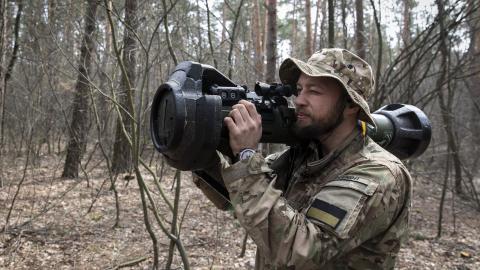British Defense Secretary Grant Shapps visited Kyiv last week to meet President Volodymr Zelensky and Ukrainian defense officials. It was his third visit since he became defense secretary last August. On this trip, Shapps said the UK would commit $450 million to provide Ukraine with 10,000 advanced drones.
Such a commitment from London should not come as a surprise. There have been many geopolitical changes in Europe since Russia invaded Ukraine in February 2022. Longstanding neutral countries such as Sweden and Finland have joined NATO, the world’s leading military alliance. Before 2022 this would have been unthinkable. Russia is now reliant on weapons from North Korea and Iran. Moscow is even manufacturing Iranian-designed Shahed drones inside Russia for use against Ukraine. Again, this is something that would have been unimaginable before 2022. But one of the most important geopolitical shifts is the re-emergence of Britain as a major actor in Europe.
Immediately after the Brexit vote in 2016, many policymakers and commentators were wondering what the UK’s future role in Europe would be. Throughout the tense Brexit negotiations with the EU in the years after 2016, it seemed to some that Britain’s influence across Europe was waning. On the contrary, after Russia's invasion of Ukraine in 2022, it is clear that British influence across the continent is on the ascendancy.
This is because the UK stepped up to lead at a time when many other European countries, and the US too, were dithering. British leadership matters because the war in Ukraine is of vital importance to the West. Russia’s invasion has changed the geopolitical landscape in Europe in a way not seen since the 1940s. For the first time in the 21st century, one country used military force to annex part of another. The last time this was done anywhere in the world was in 1990 when Iraq, under the rule of Saddam Hussein, invaded Kuwait. So the stakes are high for European security. And far from shying away from its European responsibilities, Britain has led the way in supporting Ukraine at almost every turn.
The UK has repeatedly rallied its European neighbors to support Ukraine. For example, in early 2022 during the lead up to Russia’s invasion, when many European countries were in denial that such a military operation would take place, the Royal Air Force was already airlifting much-needed weapons to Ukraine. These included the very capable anti-tank weapons that proved to be crucial in the defense of the capital Kyiv in the opening days of the conflict.
By the early summer of 2022, the UK started a program to train 10,000 Ukrainian soldiers a year at locations across Britain. This happened months before any other country publicly committed to training Ukrainian soldiers. In fact, the UK training mission was started months before the EU started its training mission for Ukrainian soldiers in the autumn of 2022.
After the first major wave of airstrikes against Ukrainian civilian infrastructure in October 2022, Britain was among the first countries to say that advanced air defense systems would be sent to Ukraine. Weeks later, the British were also the first European country to commit to sending main battle tanks to Ukraine. The UK was also the first country to commit to training Ukrainian pilots to fly F-16 fighter jets.
Perhaps the boldest expression of support to Ukraine has been the UK's delivery of Storm Shadow missiles last summer. With a range of 250km, the Storm Shadow was the first long-range weapon to be provided to Ukraine by the West. Soon after the Brits provided Storm Shadow, the French followed by providing their version of the same missile. Since its first use last summer, the Storm Shadow has played the leading role in enabling the Ukrainians to strike the Russian Navy. The missile’s long range has pushed the Russian Navy far enough away from Ukrainian waters to allow grain exports to continue to the Global South. In addition, last December the UK launched a program to help Ukraine improve its naval capabilities.
British support for Ukraine is just the latest example of Britain’s important role in European affairs. For hundreds of years, England, and then later the UK, has played a major role in Europe. This will continue to be the case for hundreds more years into the future. Britain’s relationship with the EU is hardly a determining factor.
British support for Ukraine is made easier by the fact that issue has not become politicized in the way that it has in the US. There is strong support for Ukraine throughout the chamber in the House of Commons. As the UK heads into a general election this year, it is unlikely that there would be any significant change in Britain’s leadership role on Ukraine if the Labour Party won power.
Of course, there was a lot of post-Brexit anxiety across Europe. But the UK’s steadfast and consistent displays of commitment to European security are undeniable: so much so that some members of the European Parliament have called for an EU-UK defense treaty.
The war in Ukraine, and the UK’s response to it, should once and for all relieve any anxieties some may have had about Britain’s role in Europe after Brexit. Geographically, the UK is a European country. Geopolitically, it is a European power. It always has been and always will be.















